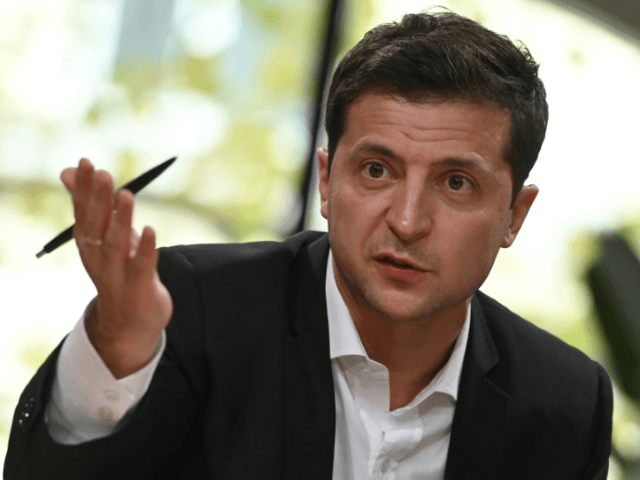Ukrainian President Volodymyr Zelensky added NATO member Turkey to his travel itinerary this weekend, urging Islamist President Recep Tayyip Erdogan to support Kyiv as tensions, fueled by a large military buildup by Russia, escalate in the east of the country.
Russia has flooded its side of the border with Ukraine with heavy military equipment in the past month, raising concerns that it is considering an invasion of the country. Russia has already invaded and colonized part of Ukraine, the Crimean peninsula, in a widely condemned operation in 2014, when the war in Ukraine’s eastern Donbass also began. Zelensky visited Donbass, across from where the Russian military buildup is taking place, last week to meet with soldiers on the front lines and assess the increasingly deadly situation there.
Turkey and Russia have a complex relationship damaged by historically adverse positions and Turkey’s longstanding membership in NATO and alliances with the United States and Europe. Much of the latter has eroded under Erdogan, however, who has signed lucrative trade deals with Moscow and purchased Russian missiles that openly violate NATO agreements.
Russian military assets began rapidly appearing on the border shortly after Zelensky signed an executive decree featuring a comprehensive plan for Ukraine to expel Russia’s illegal presence in Crimea. Kyiv claims “dozens” of countries support the effort.
Kremlin officials have not denied the military buildup but insisted that what Russia does with its troops within its borders is not the business of any other country.
In anticipation of a potential open conflict between Ukraine and Russia, Zelensky has escalated his appeal to NATO for his country’s membership and attempted to garner support from the administration of American President Joe Biden. In remarks republished by the Ukrainian news agency Unian on Tuesday, Zelensky addressed the greater Western world, stating that the West is just as much the target audience for Moscow’s military buildup as Ukraine itself.
“They want the West to be frightened of Russia’s strength, of her power. There’s no big secret here,” Zelensky reportedly told Time last week, according to Unian.
Perhaps concerned with Biden’s tepid response to the current climate on the Ukrainian-Russian border, Zelensky met with Erdogan for talks ranging from expanding trade ties to support for Ukraine’s sovereignty. The formal reason for Zelensky’s visit was the “9th meeting of the Turkey-Ukraine High-Level Strategic Cooperation Council,” according to the pro-Erdogan Turkish newspaper Yeni Safak. Prior to his visit, the two countries had agreed on a plan to significantly increase trade volume to $10 billion.
.@RTErdogan, #Ukraine is pleased to have a reliable neighbor, even if our border is the sea. 🇺 and 🇹🇷 are opening new horizons of cooperation: possible growth of investments in infrastructure, increase in trade turnover, partnership in energy and defense spheres. pic.twitter.com/HxCeN95EW0
— Володимир Зеленський (@ZelenskyyUa) April 10, 2021
At a joint press conference with Erdogan on Saturday, Zelensky thanked Erdogan for “words on the continuation of such important support” regarding Ukraine’s national security.
“First of all, we thoroughly discussed security issues and joint counteraction to challenges in the Black Sea region, and it is worth noting that the Kyiv and Ankara have a common vision both with regard to the threats as such and with respect to the ways to properly respond to these threats,” Zelensky said.
Erdogan, on his part, stated plainly that he wished to see “calm and stability” and opposed any “higher degree of tension” in the region. He specifically mentioned his support for Zelensky’s plan to expel Russia from Crimea.
“Once again we have reaffirmed our basic principle of non-recognition of the illegal annexation of Crimea,” Erdogan said.
Erdogan spokesman Ibrahim Kalın reiterated Turkey’s opposition to Russia’s colonization of Crimea on Monday.
“Turkey defends Ukraine’s territorial integrity and the rights of Crimean Tatars and supports the settlement of the problems between Russia and Ukraine through negotiations,” Kalın wrote on Twitter. “All kinds of tensions and conflicts in the Black Sea and the region are to the detriment of everyone.”
Turkey’s stance on Ukraine may harm its relations with Russia, which have enjoyed relative stability in the past decade compared to the two nations’ historical conflicts. The core of Erdogan’s overtures to Russian leader Vladimir Putin has been a 2017 agreement to purchase Russian S-400 surface-to-air missiles for the Turkish military’s use, a violation of NATO protocol. NATO requires all member nations to only use equipment that is interoperable with the technology of all members, as the treaty organization can be called upon at any moment to act as a unified army. The United States imposed sanctions on Turkey following the purchase in recognition of the violation but has failed to convince Turkey not to integrate the equipment into regular Turkish military use.
Independent of the agreement, Ankara has found itself at odds with Moscow in at least three war theaters it has chosen to recently enter. In Libya, Turkish paramilitaries helped defeat Russian ally Gen. Khalifa Haftar in an attempted siege of Tripoli. In Syria, Turkey has repeatedly urged the overthrow of Russian ally Bashar al-Assad, though Russian forces have largely concentrated on attacking Kurdish forces there, not Syrian Arab troops. In the disputed territory of Nagorno-Karabakh, Turkey helped ally Azerbaijan expel the ethnic Armenian separatist government there last year. Armenia and Russia are longstanding allies.
Amid the Nagorno-Karabakh conflict, Russian Foreign Minister Sergei Lavrov remarked, “we have never considered Turkey as our strategic ally.”

COMMENTS
Please let us know if you're having issues with commenting.